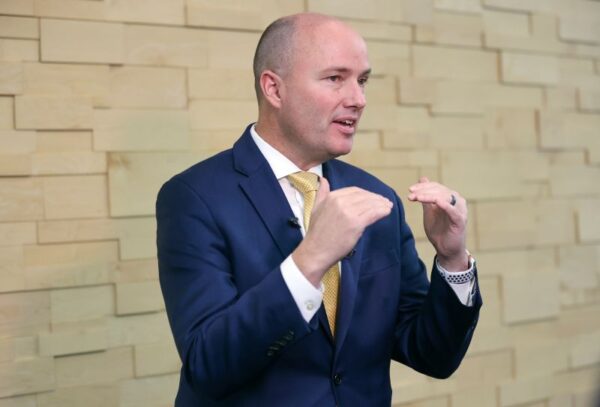With research beginning to show negative effects of social media on teens, lawmakers are looking into what they can do. Some possible solutions include banning cellphones from Utah classrooms, setting age limits on social media, and taking on the algorithms.
“There is a compounding effect that is impacting all of us and I am deeply worried about it,” Cox said at his recent symposium. “I know we have some social media companies in the room, we’re glad you’re here. We are putting you on notice. You have some options. You can fight, and that’s fine. We’re ready for the fight. Or you can join us and be part of the solution.”
Social Media and Mental Health Symposium
In an attempt to combat the potentially catastrophic effects of social media on Utah teens, Governor Cox held a Social Media and Mental Health Symposium on Tuesday, January 10.
There were four sections of the symposium, beginning with a conversation between Cox and Brad Wilcox about the effect of technology on today’s teenagers.
There were also panel discussions on public health concerns for Utah teens, navigating social media as parents and youth, and legislation in social media.
What Utah Is Doing About It
Utah’s legislators recognized that they could not fix everything, but there were some things they could start doing to lessen the effects.
“Government is not going to solve all of our problems,” said Cox. “Government was never designed to solve all of our problems, but it can help us, as parents, as individuals, as families, take collective action.”
Though the research does not fully back the link between mental health problems and social media, there is growing evidence that it’s a possibility, and Cox said that was enough for him. And other lawmakers have been on this initiative for much longer than the governor.
“We talked about some of those harmful algorithms that we’re seeing, there’s some component of legislation that we need to have in there that puts some skin in the game for the social media companies and how they’re driving these addictive features,” said Representative Jordan Teuscher. “If they continue to move in this direction, if they aren’t protecting our kids, there’s liability. We’re looking at the best way to do that.”
Possible Solutions for Social Media Use
No such legislation has yet been made public or official, though some policy proposals have been floated out there.
Senator Mike McKell is pushing toward requiring parental tools and age verification for social media apps.
Teuscher talked about raising the age limit to as high as 16, even including parental controls up to age 18. Discussions at the symposium compared the dangers of social media to that of tobacco use. If your child came home with a cigarette at 13, that would be a concern. So is 13 really a good age to start on social media?
Many lawmakers, including Representative Trevor Lee, are working to ban cellphones from the classroom. Cox supported this idea when he said, “Even if you have kids turn their phones off when they come into class, when the device is on your person, it is still connected to your brain.”
Finding that balance for the right amount of technology use, though, is tough.
Will It Work?
With all of these ideas for cracking down on social media, the biggest question is will any of it work? Will lawmakers, teachers, parents and youth be able to lower suicide rates, improve quality life, and strengthen families in Utah?
Some research points to potentially very positive outcomes, but only time will tell what the results will be.
– by Abbie Call
Feature image caption: Gov. Spencer Cox speaks to members of the media during a Social Media and Youth Mental Health Symposium at O.C. Tanner in Salt Lake City on Tuesday, Jan. 10, 2023. Courtesy ksl.
Read more about specifically the fight against TikTok in Is TikTok Safe for Kids? by Elaine Baldwin.

Abbie Call – Cannonville/Kirksville, Missouri
Abbie Call is a journalist and editor at The Byway. She graduated in 2022 with a bachelor’s degree in editing and publishing from Brigham Young University. Her favorite topics to write about include anything local, Utah’s megadrought, and mental health and meaning in life. In her free time, she enjoys reading, hanging out with family, quilting and hiking.
Find Abbie on Threads @abbieb.call or contact her at abbiecall27@gmail.com.

